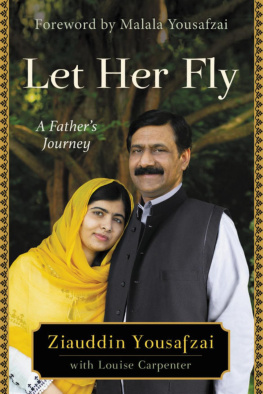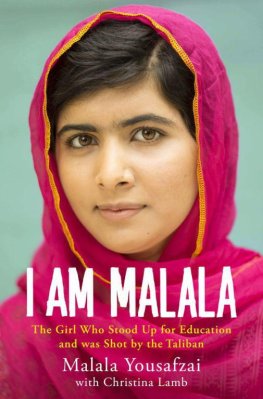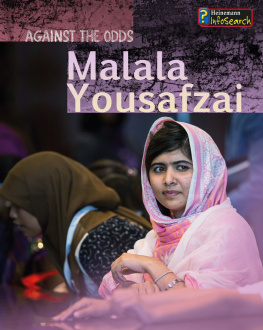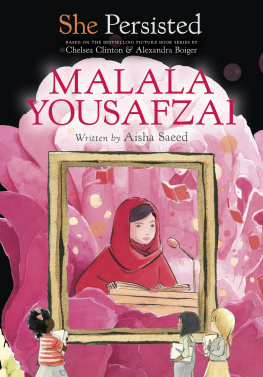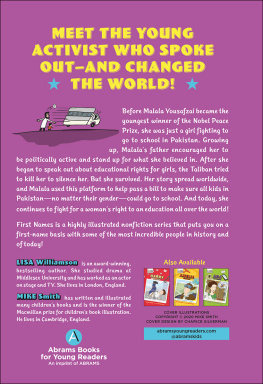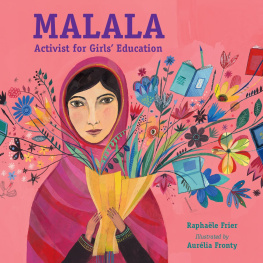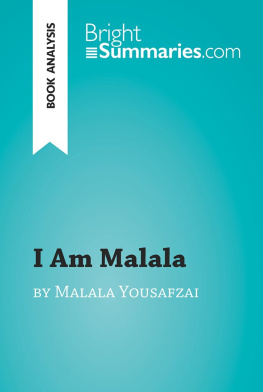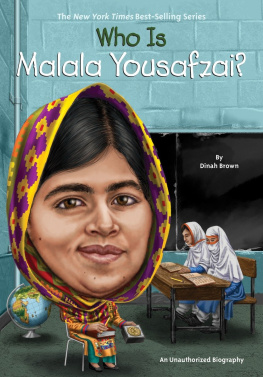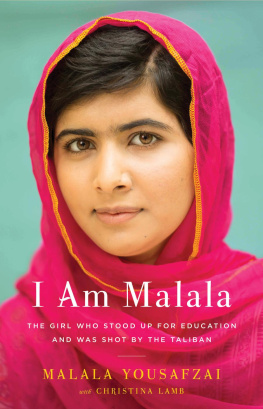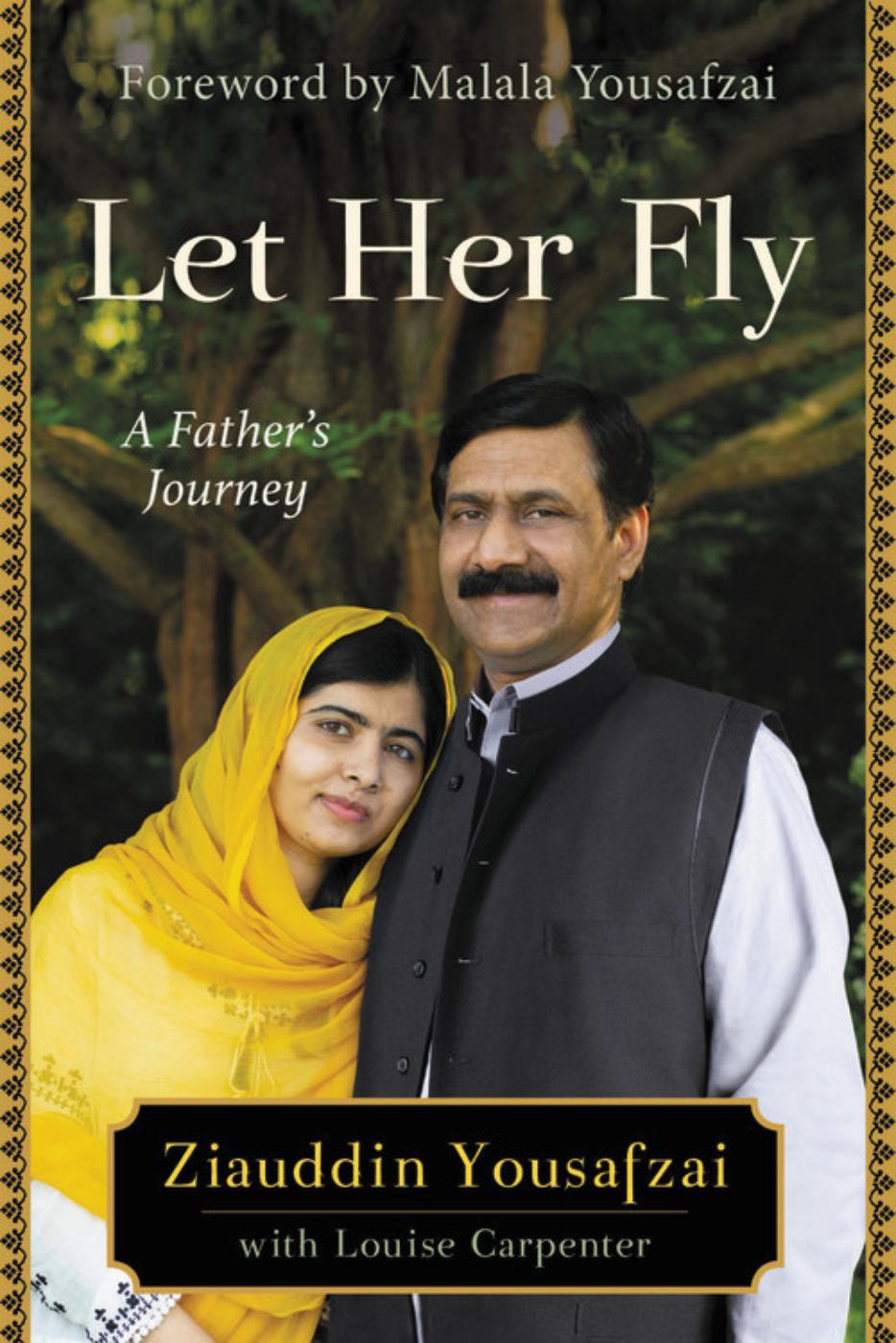The scanning, uploading, and distribution of this book without permission is a theft of the authors intellectual property. If you would like permission to use material from the book (other than for review purposes), please contact permissions@hbgusa.com. Thank you for your support of the authors rights.
Little, Brown and Company is a division of Hachette Book Group, Inc. The Little, Brown name and logo are trademarks of Hachette Book Group, Inc.
The publisher is not responsible for websites (or their content) that are not owned by the publisher.
The Hachette Speakers Bureau provides a wide range of authors for speaking events. To find out more, go to hachettespeakersbureau.com or call
(866) 376-6591.
To Dr. Col. Muhammad Junaid and
Dr. Mumtaz Ali, who performed lifesaving surgery on Malala in Pakistan after she was shot. With the grace of God, they saved Malalas life.
By Malala Yousafzai
I WRITE THIS FOREWORD to thank my father.
For as long as I have known him, my father has been the personification of love, compassion, and humility. He taught me about love, not simply through words, but through his own acts of love and kindness. I never saw my father being disrespectful or unfair to anyone. Everyone was equal to him, whether Muslim or Christian, fair or dark, poor or rich, man or woman. As a school principal, a social activist, an active social worker, he was caring, respectful, and supportive to everyone. Everyone loved him. He became my idol.
We were not a rich family financially, but we were ethically and morally rich. Aba has the view that for a happy life wealth is neither a factor nor a safeguard. We never ever felt poor, though I precisely remember those times when we did not have enough money for food. If my father made a little money from school profits, he would spend most of it in one day on the family, buying fruit, and would give the rest to my mum, as she was the one sorting out the familys shopping for furniture, cutlery, etc. Shopping was boring for him, so boring that he would often start arguing with my mum if she took too long. My mum would tell him off and remind him, You will thank me when you wear this suit. He loved seeing my brothers, my mum, and me happy and healthy. For him we had what mattered most in our lives: education, respect, and unconditional love, which was enough to make us feel rich and happy.
His love for me made him my shield from all things bad and evil around me. I grew up to be a happy, confident child, even in a society that was not offering the happiest outlook for my future as a woman. A deep respect for women and girls filled the home I grew up in, even when it was not mirrored in the world beyond our walls. But my father provided me with the shield of love. He was my defense in a society that did not treat me as equal. From the beginning, he stood against everything that threatened my future. Equality was my right, and he made sure that I got it.
This culture of respect in our home, especially for women, came with Abas belief in the value of living life to the fullest and taking the chances that it gives us. I learned from him that I must do the best I can, that I must be the best I can be, and that I should respect people no matter where they come from.
My father and I have been friends since the very beginning and still are, which becomes rare as girls grow older and a gap starts developing. I used to share almost everything with my dad, more than I would with my mum, from complaining about period pain to asking him to get me period pads. In fact, I was quite scared of my mum, as she was strict. My father would always take my side if I got into an argument with my brotherswhich would kind of happen every day!
I was not any different from the other girls in my class in Pakistan, my friends from my neighborhood, and the other girls of the Swat Valley. But I had the invaluable opportunity of receiving a supportive and encouraging upbringing. It was not that my father would give long lectures or advice to me every day. It was rather that his manners, his dedication to social change, his honesty, his openness, his vision, and his behavior had a big influence on me. I was constantly appreciated by my dad. I was always being told You are doing so well in your studies, Jani, You are speaking so well. Jani, which means love or soul mate, is his nickname for me. I was always recognized and encouraged for my little accomplishments, my schoolwork, art, speaking competitions, everything. My dad was always proud of me. He believed in me more than I believed in myself. And this gave me confidence that I could do anything and everything.
My father is a great listener, and this is one of his qualities that I have always loved. Of course, I am exempting the times when he is busy on his iPad on Twitter. Then you have to call his name, Aba, at least ten times for him to respond. Though he says Yes, Jani, every time I call him, he is actually not listening while he is on Twitter, and I can tell. When he is listening to people, especially children, he is fully engaged and completely attentive to what they have to say. He was like that with me as well. He always listened to me, to my little stories, my complaints, my worries, and all my plans. My father made me realize that my voice was powerful and that it was important. This is what encouraged me to use my voice and gave me immense confidence. I knew how to tell a story, I knew how to speak up, and when the Taliban came, I felt I had the power to raise my voice to defend my education and my rights.
Growing up, I began to see how different my parents were when girls around me were either stopped from going to school or were not allowed to go to places where the crowd included men and boys. We lose so many women and girls in this kind of society, where men decide how women should live and what women should do. I have seen incredible girls who were forced to give up their education and their futures. These girls were never given a chance to be themselves. But I was not one of those girls. I would give speeches in places where only boys were speaking, and all around me Id hear men saying, These girls should be kept separate! Some of my own classmates and friends were forbidden by their fathers and brothers from taking part in these school debates between girls and boys. My father was strongly against this mind-set and wanted it to change.
I remember that my dad would be in the guest room of our house with his friends and elder men visiting him, having a conversation, and I would take tea in for them and sit down and join them. My dad never said, Malala, you know, we are having an adult conversation here, discussing politics. He would let me sit and listen, and, more than that, he would let me tell the room my opinion.
This is important because a girl growing up in an unequal home or society has to fight her fears that her dreams for herself will not come true. For millions of girls, school is a safer place than home. At home, they are told to cook and clean and prepare for marriage. Even for me, with my parents, school represented safety from societys limitations. When I went to school, my world was my amazing teachers and my amazing principal, and beside me in the classroom were my friends, and we were all talking about learning and our dreams for our futures.

